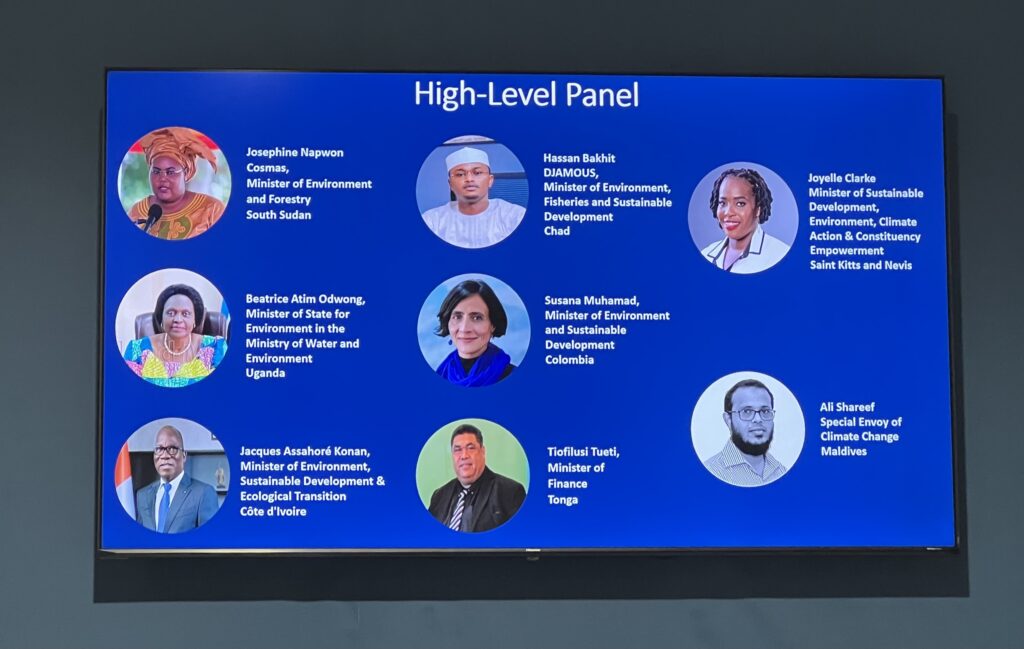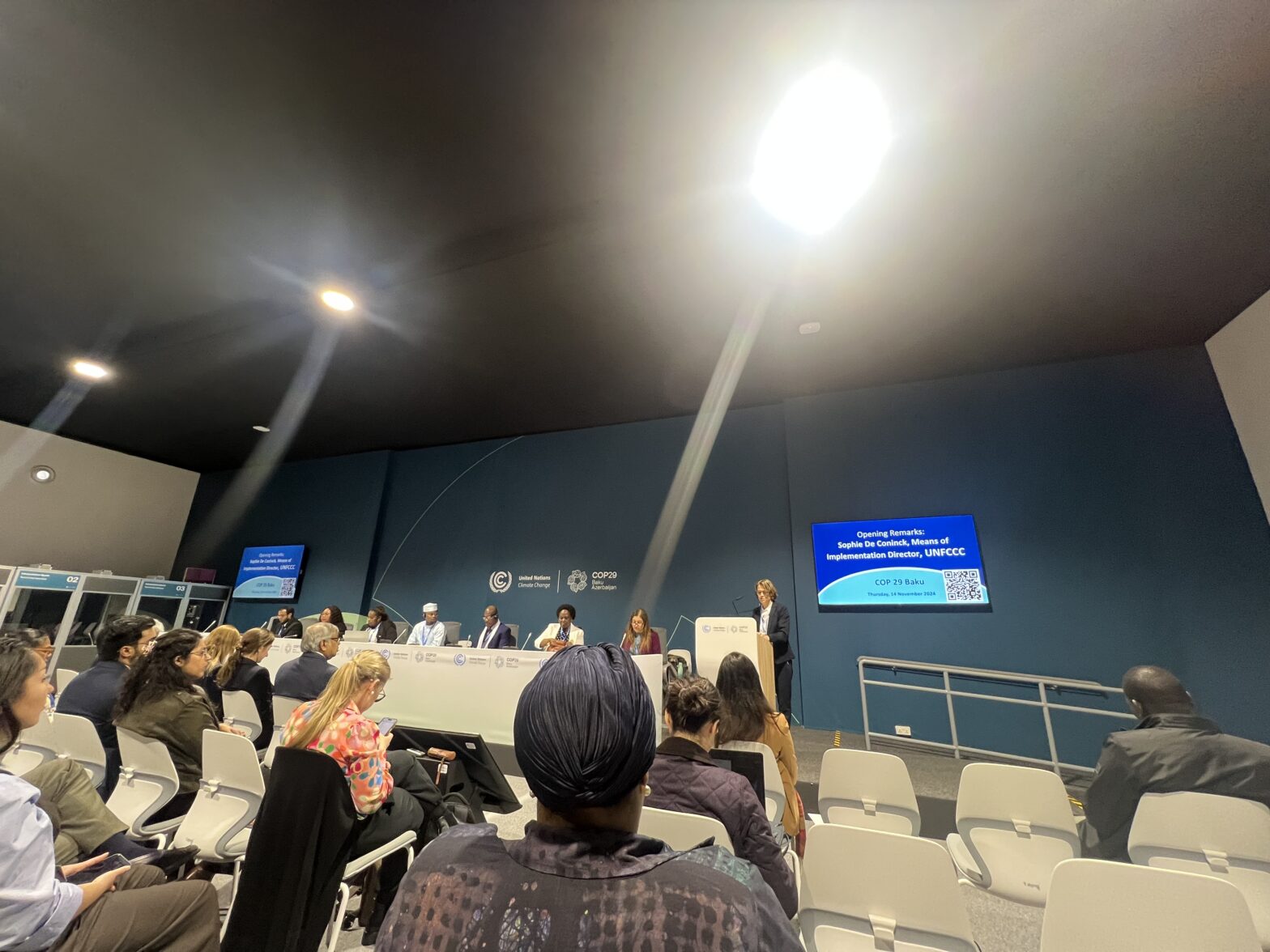By Jessica Legaard, ’25, Environmental Studies
Finances were central to the Conference of Parties (COP) this year in Baku, Azerbaijan. The parties to the Paris Agreement (CMA), agreed to set new climate finance targets for a “New Collective Quantified Goal” (NCGQ). This goal is meant to revise the prior goal of $100 billion. To reach the ambition of lowering emissions, funding is needed from wealthy Global North countries. They need to fulfill their responsibility of providing higher-risk and climate-vulnerable countries with the support for building resilience. Global North countries have had their chance to develop. Long-held inequities of colonialism continue to put developing countries at higher risk of climate change. Now is the time to act and to ensure no country and no one is left behind.
During the first week of the “Finance COP,” I attended an event entitled “Climate Finance Needs of Developing Countries.” I made my way from the pavilion area into the Side Event segment of the venue. In my mind, I perceived this panel as a significant topic that needed to be at the forefront of the negotiations and of all policy and decision-maker minds. How was this conversation not directly included in the negotiations? I have now come to a better understanding of the rules, processes, and conventions of The United Nations Framework Convention on Climate Change (UNFCCC). Before learning and overcoming this challenge, I was surprised that on the UNFCCC website, the assigned room for this panel was placed in a Side Event room. My initial thought was, “Why was this event not placed with higher importance?” From a birds-eye view, COP has a strictly packed schedule with Press Conferences, Side Events, and Negotiations. This does not begin to cover the informal conversations and interactions that spur from panels, talks, and the Pavilion Exhibit. Therefore, every event cannot be given the necessary time and dedication to address the challenges and steps for moving forward. Party delegates, observers, media, and other stakeholders rushed around Baku Stadium, scurrying like ants. There was simply not enough time in the day or two weeks designated for these significant issues.

Sitting in Side Event room eight, I watched ministers of finance, environment, and sustainable development fill the room. They shook hands and reviewed their notes for the event that began promptly. Sophie De Coninck, Means of Implementation Director of UNFCCC, began the event by making remarks about the need for financial inclusion for the most vulnerable populations. She exclaimed that now is a more pressing time than ever to leverage the dollar, nationally and internationally, because it is vital to build an inclusive economy. Finally, the panel began which included delegates from South Sudan, Uganda, Côte d’Ivoire, Chad, Tonga, Colombia, and the Maldives, as well as Saint Kitts and Nevis. Each representative had an allotment of three minutes to share their country’s current position and the significance of finance at this moment.

(From Left to Right: Tiofilusi Tueti; Tonga, Ali Shareef; Maldives, Josephine Napwon Cosmas; South Sudan, Joyelle Clarke; Saint Kitts and Nevis, Hassan Bakhit Djamous; Chad, Jacques Assahoré Konan; Côte d’Ivoire, Beatrice Atim Odwong; Uganda, Susana Muhamad; Colombia.)
Susana Muhamad, the Colombian Minister of Environment and Sustainable Development and President of the Convention on Biological Diversity (CBD COP16) began her speech. Muhamad set the scene and provided context for the audience about Colombia. As a middle-income country, the current “fiscal situation does not represent [that of] a middle-income country.” Colombia’s economy relies heavily on the extraction and exportation of fossil fuels. Hence, how will they replace the exports of fossil fuels and ensure a whole economic transition? When Muhamed references a “whole economic transition,” she is validating the need to repair communities that have vested themselves in fossil-fuel exploitation. A just transition is needed to ensure these developing-country fossil fuel-based communities that rely on this income are not left yet further behind. The people of these communities face health effects from exposure to hazardous and toxic materials. Labor workers will lose their jobs. Basic human rights need to be ensured in the next phase as we move into a “green” economy. Alternative economic sectors need to come to fruition now as we enter a critical stage of the climate crisis. Additionally, Colombia faces “emergency after emergency.” Muhamad stated that 85% of territories have flooded, Amazon fires rage on, and the need to protect biodiversity and stop deforestation becomes even more pertinent. She quickly commanded the room with the gravity of her statements. Everyone heard the strong emotions that radiated through Muhamad’s persuasive stance.
I was quickly overwhelmed by the implications of the Minister’s statements and cries for change in the economic system. I could see how deeply she cared for her people and her drive in wanting to protect their collective home. This was not just a duty she had to fulfill but an obligation to protect her and her people’s homes. At this moment I did not see Muhamad as a delegate but a humanitarian advocating for the future of their country. Her home was weighing on her shoulders and the outcome of COP29. What made her words all more powerful was her commitment to conveying that Colombia was not a victim of these circumstances. Despite having little capital to leverage and invest in other sectors of the economy, she would not stop fighting the growing battle of not just debt, but debt compounded by the climate crisis. The time to act is now, but with little multilateral support, the challenge to finance this economic transition becomes increasingly challenging. Muhamad finished her remarks and everyone in the room burst into applause, the sound of which will forever continue to ring in my ears.
